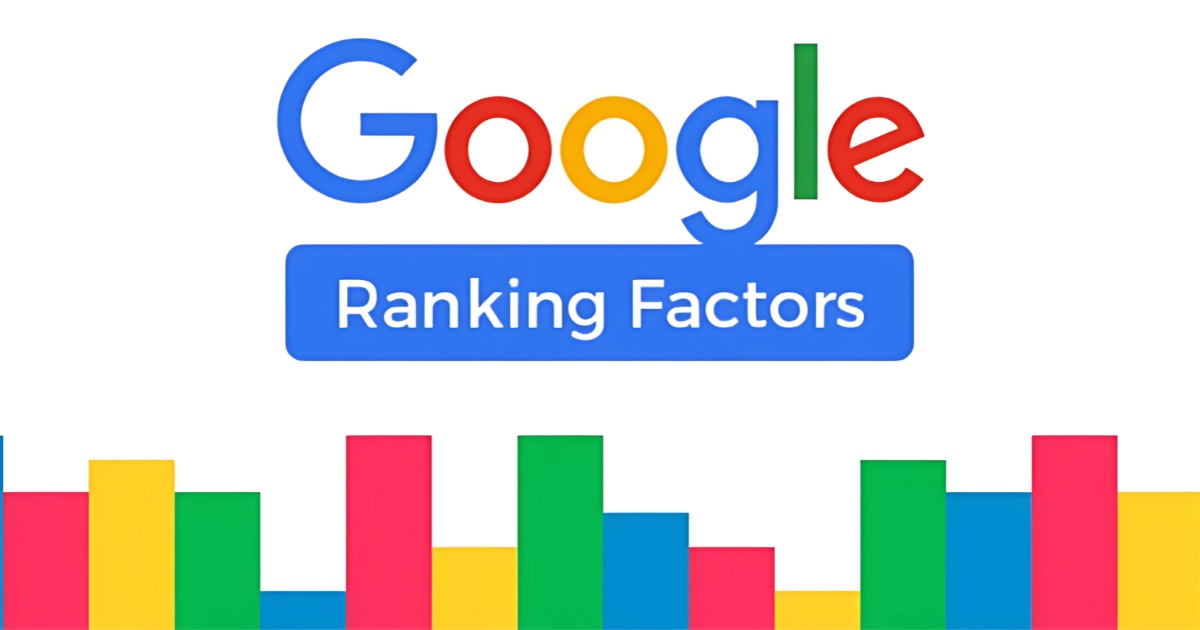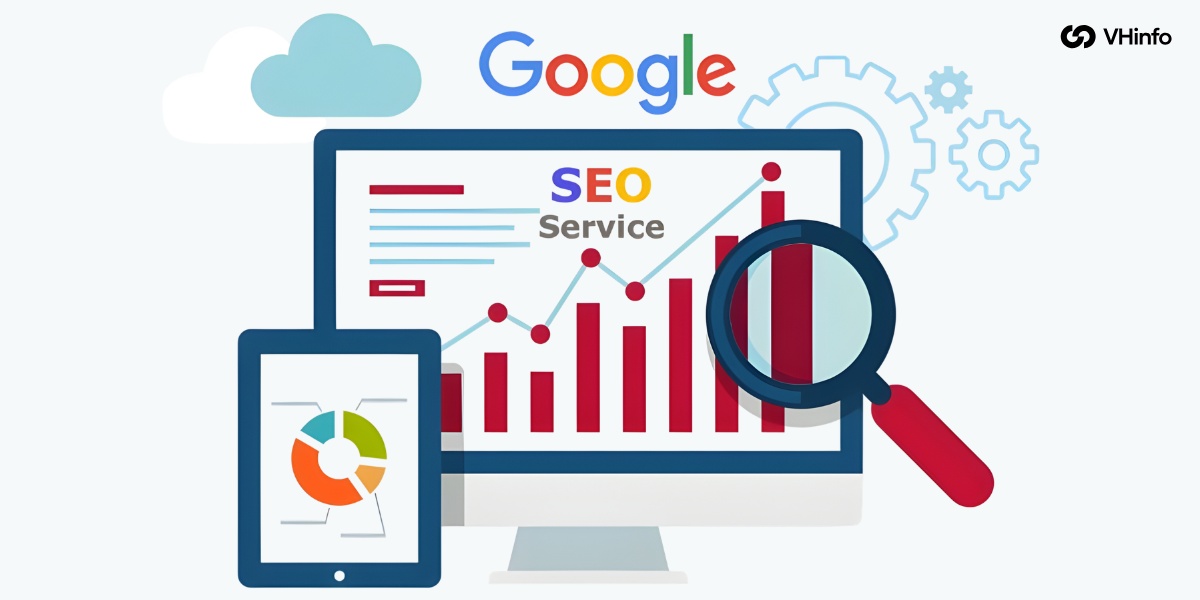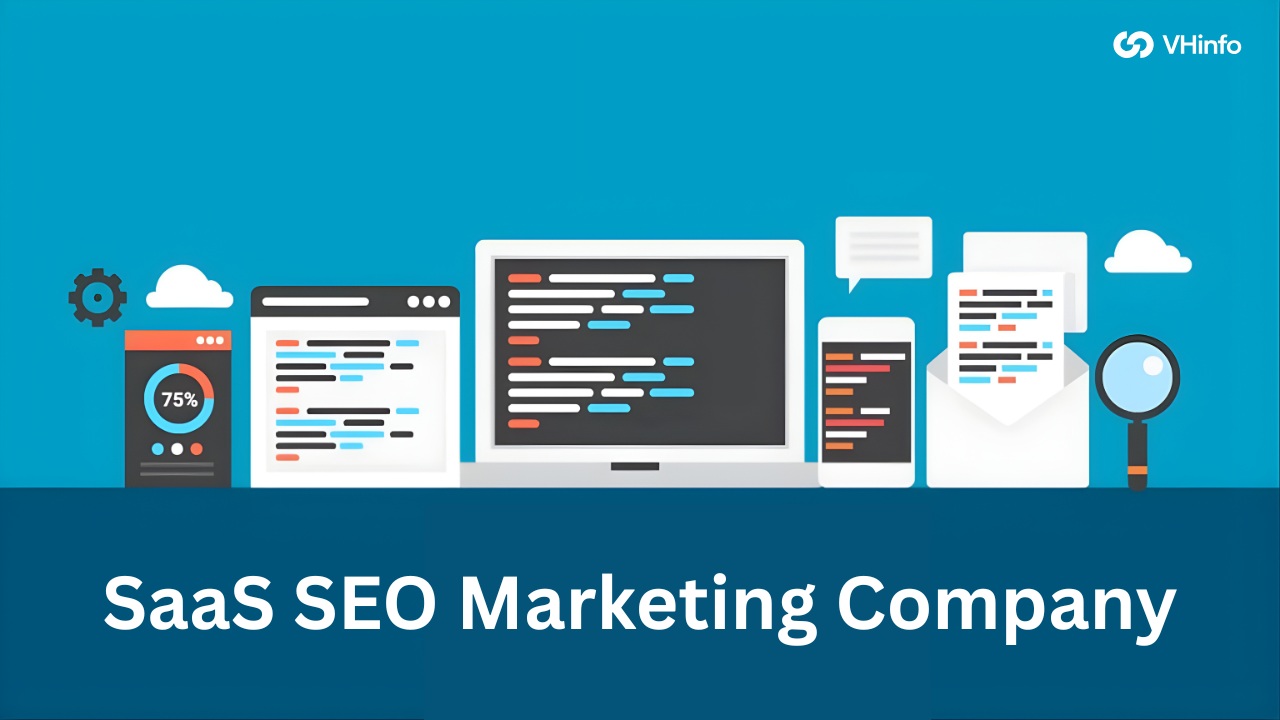Want to rank higher on Google in 2025? It’s all about mastering the most important Google ranking factors.
As Google’s algorithm evolves, staying ahead means focusing on what truly matters: high-quality content that matches user search intent, a technically sound website (think site speed and mobile-friendliness), and earning backlinks from trusted sources.
For SaaS businesses, cracking this code can boost organic traffic and visibility in search engine results.
At VH Info, we help companies nail these elements—whether it’s optimizing title tags for target keywords, fixing website structure, or building domain authority through strategic link building.
Forget chasing trends; success lies in balancing technical SEO basics with content quality that keeps users engaged.
Let’s break down what Google cares about this year.
What Is A Google Ranking Factor?
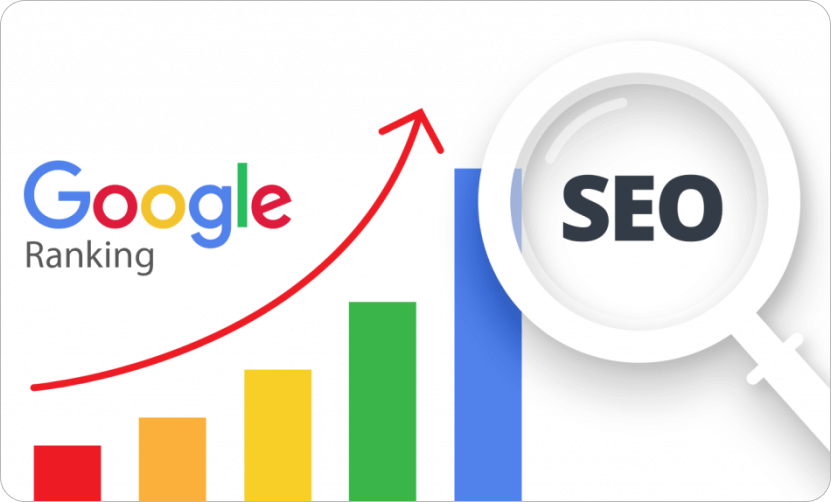
A Google ranking factor refers to any element that Google’s algorithm considers when determining how to rank web pages in search engine results.
These factors are essentially signals that help Google evaluate a page’s relevance, authority, and quality relative to a specific search query.
Google uses over 200 ranking factors in its algorithm, though the exact number and weight of each factor remains proprietary information.
Some ranking factors are officially confirmed by Google, while others are based on SEO experts’ observations and testing. Each ranking signal contributes differently to your overall ranking, with some carrying significantly more weight than others.
As a website owner or SEO professional, focusing on the most important Google ranking factors allows you to prioritize efforts that will have the greatest impact on your search engine rankings and organic traffic.
What Does Google Look For In SEO?

How Do Google Search Rankings Work?
Google’s search engine works through three primary processes: crawling, indexing, and ranking.
Googlebot crawls the web, following links to discover new content and changes to existing web pages. Once crawled, pages are processed and added to Google’s index, a massive database of web content.
When a user enters a search query, Google’s ranking algorithm sorts through billions of indexed pages to determine which ones best answer the query. The algorithm analyzes hundreds of ranking signals, including keywords, website speed, mobile friendliness, and backlink profiles, to deliver the most relevant results to users.
This complex system aims to match the user’s search intent with the most helpful content available, prioritizing pages that demonstrate expertise, authority, and trustworthiness related to the search terms.
What Is E-A-T and Why Does It Matter?
E-A-T stands for Expertise, Authoritativeness, and Trustworthiness—three important elements Google uses to evaluate content quality. While not a direct ranking factor itself, E-A-T reflects Google’s broader goals of providing users with reliable information from credible sources.
For websites in YMYL (Your Money or Your Life) sectors—financial, medical, legal, and safety-related topics—E-A-T carries even greater importance. Google holds these sites to higher standards because inaccurate information could potentially harm users.
To improve E-A-T, focus on creating accurate, well-researched content written by subject matter experts. Build your site’s reputation through high-quality backlinks from authoritative sources, clear author credentials, and transparent information about your company.
At VH Info, we help SaaS companies establish their E-A-T through strategic content development and link building that signals expertise to Google’s algorithm.
What Is On-Page SEO and Off-Page SEO?
On-page SEO encompasses all optimizations you make directly on your website.
This includes keyword optimization in title tags and content, internal links, schema markup, high-quality content creation, and technical elements like page speed and mobile friendliness.
These factors are largely within your control and form the foundation of any effective SEO strategy.
Off-page SEO refers to external ranking signals that happen away from your website, with backlinks being the most significant component.
When authoritative websites link to your content, they pass “link juice” that boosts your domain authority and signals to Google that your content is valuable and trustworthy.
Social media mentions, while not direct ranking factors, can increase visibility and drive traffic that indirectly supports SEO performance.
Both on-page and off-page SEO work together to create a comprehensive strategy. Even the best on-page optimization won’t reach its full potential without quality backlinks, while off-page efforts may fall flat if they lead users to poorly optimized pages.
How To Monitor Search Engine Rankings?
Tracking your website’s performance in Google search results requires consistent monitoring using reliable tools.
Google Search Console provides free insights directly from Google, showing how your site appears in search results, which queries drive traffic, and identifying technical issues that might affect rankings.
Third-party rank tracking tools like Ahrefs, SEMrush, and Moz offer more comprehensive tracking capabilities, allowing you to monitor specific keywords, analyze competitors, and track ranking changes over time.
These tools also provide metrics like domain authority that correlate with ranking potential.
When monitoring search engine rankings, track both your overall organic traffic and positions for target keywords.
Pay attention to ranking fluctuations after Google algorithm updates, content changes, or new link building campaigns to understand what impacts your specific website’s performance in search engine results.
Our Top Google Ranking Factors For Boosting Page Rankings
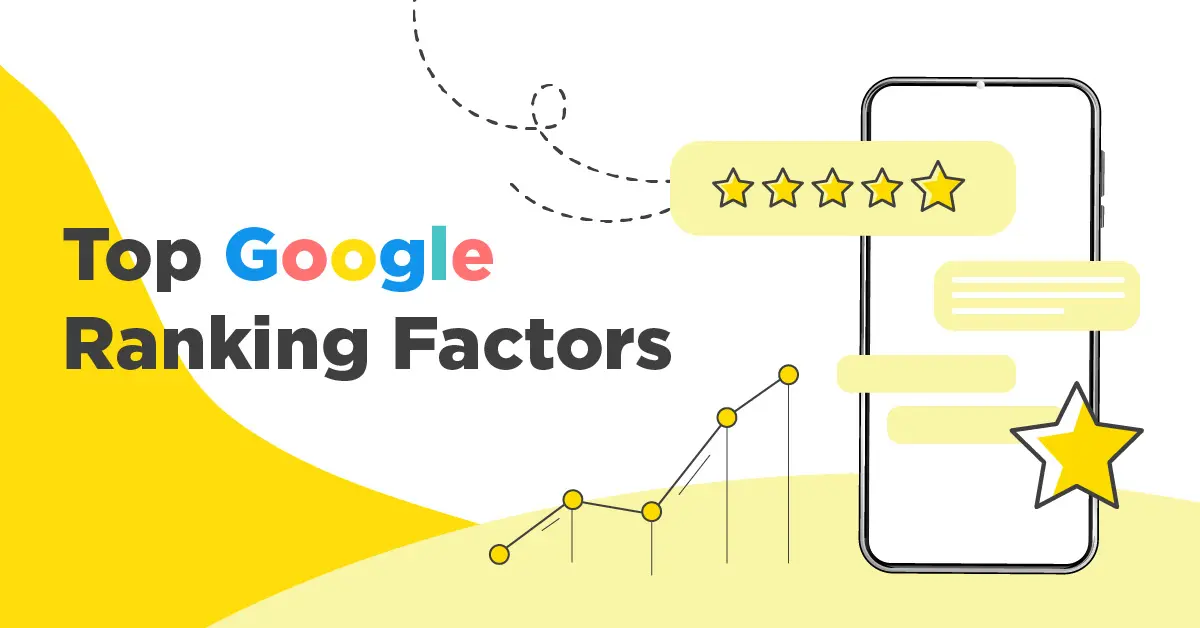
High-Quality Content

High-quality content remains the foundation of Google ranking success. Google’s algorithm evaluates content quality through various signals, including comprehensiveness, accuracy, originality, and how well it satisfies search intent.
Quality content answers users’ questions thoroughly and provides genuine value beyond simple keyword matching.
Google’s sophisticated language processing can identify content that covers related topics and synonyms (latent semantic indexing), making keyword stuffing not only ineffective but potentially harmful to rankings.
To create content that ranks well:
- Focus on addressing user search intent completely
- Include relevant keywords naturally throughout the page’s content
- Use proper headings, images with alt text, and well-structured information
- Create original content that offers unique insights or perspectives
- Update existing content regularly to maintain freshness and accuracy
Backlinks
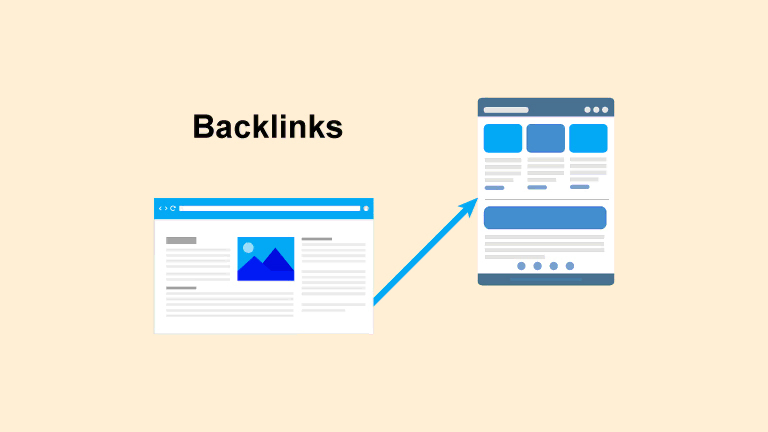
Backlinks will remain among the most important Google ranking factors in 2025.
Quality inbound links from authoritative sites signal to Google that other websites consider your content valuable and trustworthy. The impact of backlinks on search engine rankings has been repeatedly confirmed by Google and verified through countless SEO studies. Not all backlinks are equal—a few high-quality links from relevant, authoritative websites carry more weight than numerous low-quality links.
Google’s algorithm evaluates:
- The linking domain’s authority and relevance to your niche
- The context surrounding the link (anchor text and surrounding content)
- The diversity of your backlink profile
- The relevance between the linking page and your content
Link building requires a strategic approach focused on earning links through valuable content, targeted outreach, and relationship building.
VH Info specializes in creating effective link building campaigns for SaaS companies, securing relevant, high-quality backlinks that improve domain authority and search engine rankings.
Search Intent and Content Relevancy

Search intent—the reason behind a user’s query—has become a central Google ranking factor. Google’s algorithm has become increasingly adept at identifying what users are looking for when they enter search terms.
The four primary types of search intent are:
- Informational (wanting to learn something)
- Navigational (looking for a specific website)
- Commercial (researching products before purchase)
- Transactional (ready to buy)
To rank well, your content must align with the search intent behind your target keywords. This means analyzing the top results for those keywords to understand what type of content Google considers most relevant.
Creating content that matches a user’s search intent requires research into the questions and needs of your target audience.
Tools like Google’s “People also ask“ boxes and related searches can provide insights into related topics to cover for comprehensive content that thoroughly addresses user needs.
Website Loading Speed

Site speed is a confirmed Google ranking factor that impacts both search rankings and user experience. Fast-loading pages keep visitors engaged and reduce bounce rates, while slow sites frustrate users and send negative signals to Google.
Google’s Core Web Vitals, introduced as ranking signals, measure key aspects of user experience related to loading performance:
- Largest Contentful Paint (LCP): loading speed
- First Input Delay (FID): interactivity
- Cumulative Layout Shift (CLS): visual stability
To improve website speed:
- Optimize image sizes and formats
- Implement browser caching
- Minimize CSS and JavaScript
- Use a content delivery network (CDN)
- Consider server response times
Mobile Friendliness

With Google’s shift to mobile-first indexing, mobile friendliness has become an essential ranking factor. This means Google primarily uses the mobile version of a site for indexing and ranking.
Mobile optimization includes:
- Responsive design that adapts to different screen sizes
- Touch-friendly navigation elements
- Readable text without zooming
- Properly spaced buttons and links
- Fast loading times on mobile connections
Google’s Mobile-Friendly Test tool can help identify issues with your site’s mobile experience. Ensuring your website performs well on mobile devices isn’t optional—it’s a fundamental requirement for good rankings in today’s mobile-dominated search landscape.
Domain Authority
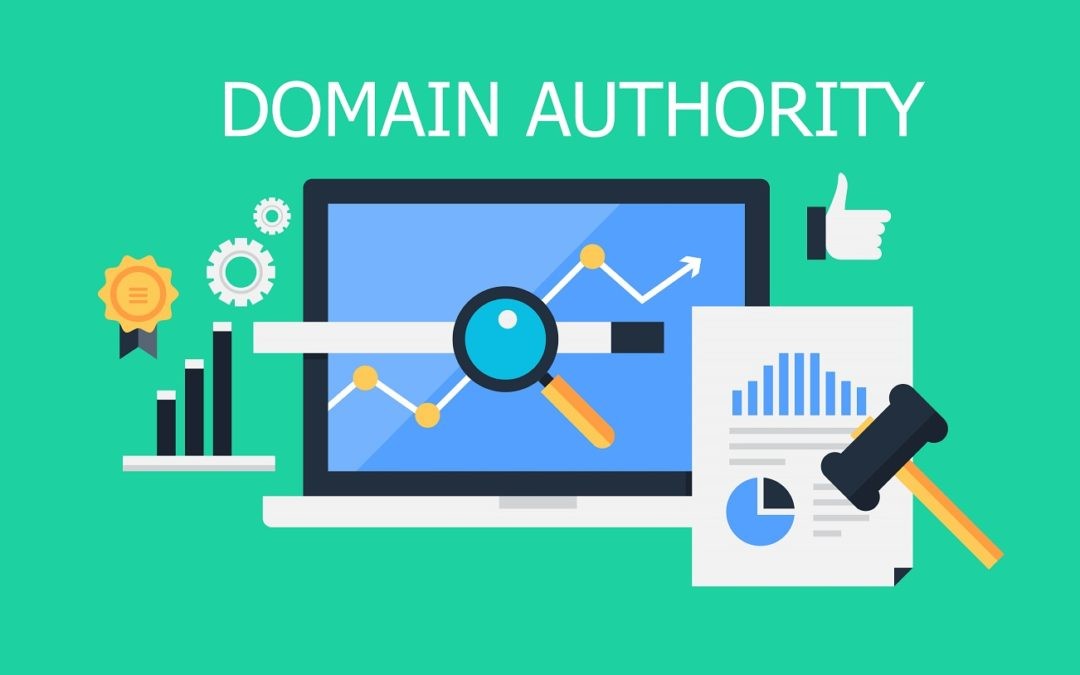
While not an official Google ranking factor, domain authority strongly correlates with ranking ability. This third-party metric, popularized by tools like Moz, measures the overall strength of a website based on its backlink profile, content quality, and other factors.
Websites with higher domain authority tend to rank more easily for competitive keywords.
Building domain authority requires a consistent approach to:
- Creating quality content that earns natural links
- Developing a strategic link building campaign
- Maintaining technical SEO best practices
- Establishing topical authority in your niche
Keyword Optimization

Effective keyword optimization remains fundamental to SEO success. While keyword stuffing is detrimental, the strategic placement of target keywords and related terms helps Google understand your content’s relevance.
Key areas for keyword optimization include:
- Title tags (with primary keywords near the beginning)
- Meta descriptions (though not direct ranking factors, they affect click-through rates)
- URL structure (clean URLs with keywords when relevant)
- Heading tags (H1, H2, H3, etc.)
- First paragraph of content
- Image alt text
- Natural distribution throughout the content
Modern keyword optimization also involves using LSI keywords (latent semantic indexing), which are terms semantically related to your primary keywords. This helps Google understand the context and depth of your content.
Website Structure
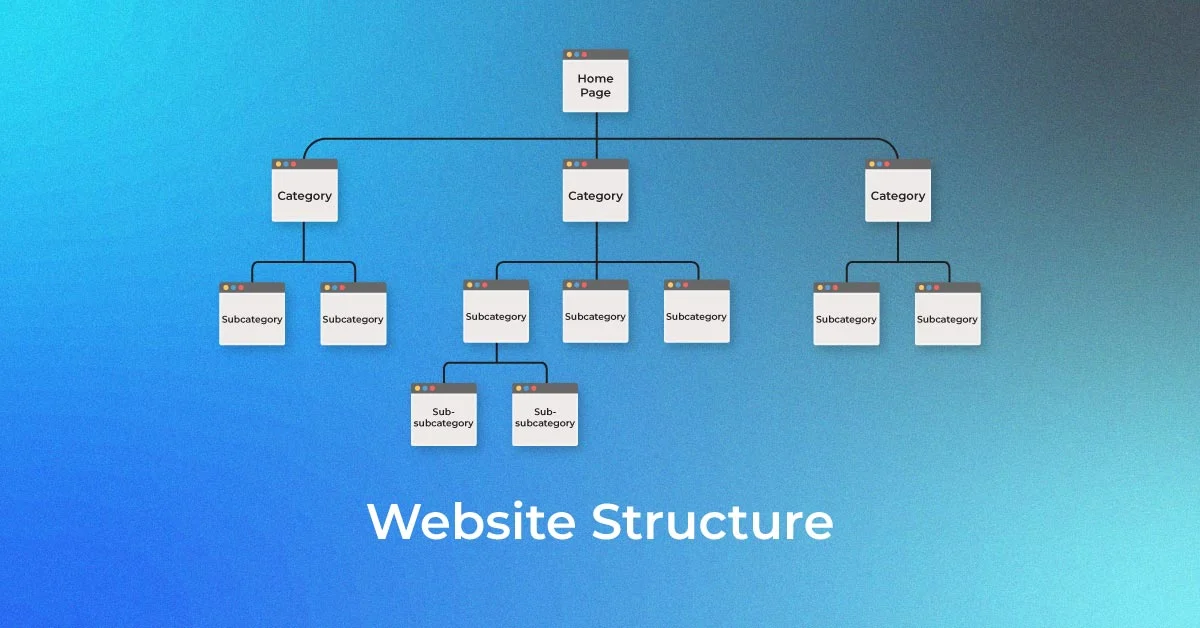
A logical website structure helps both users and search engines navigate and understand your content. Good site architecture distributes link equity throughout your site and helps establish topical authority.
Important structural elements include:
- Clear navigation menus
- Logical category organization
- Effective use of internal links to connect related content
- Proper URL hierarchy
- XML sitemaps
- Breadcrumb navigation
Internal linking is particularly valuable for SEO as it helps search engines discover and understand the relationships between your pages.
Strategic internal links pass link equity to important pages and help establish content hierarchies that signal to Google which pages are most important.
Website Security

Website security has become an increasingly important ranking factor. Google has explicitly confirmed that HTTPS is a ranking signal, giving a slight advantage to secure sites over non-secure ones.
Key security elements that impact SEO include:
- SSL certificate implementation (HTTPS)
- Protection against malware and hacking
- Regular security updates and patches
- Safe browsing experience
Beyond the direct ranking benefit, security measures build trust with users and prevent security issues that could lead to penalties or de-indexing. Implementing HTTPS is now standard practice for any website serious about SEO.
On-Page Experience

Google’s focus on user experience has intensified with the introduction of Core Web Vitals as ranking signals. These metrics measure aspects of user experience including loading performance, interactivity, and visual stability.
Other on-page experience factors include:
- Intuitive navigation
- Mobile responsiveness
- Limited ads and intrusive interstitials
- Clear, readable content
- Accessible design elements
Google’s Page Experience signals combine Core Web Vitals with existing user experience signals like mobile-friendliness, HTTPS, and safe browsing. Together, these factors help Google promote pages that offer excellent user experiences in search engine results.
3 Things Mistaken For Google Ranking Factors

Many things affect Google rankings. However, some common ideas about them are not true. These misunderstandings can lead website owners to waste their time and money on strategies that don’t work.
Bounce Rate
Contrary to popular belief, bounce rate is not a direct Google ranking factor. Google has repeatedly stated that they don’t use Google Analytics data as a ranking signal, and bounce rate can be misleading as a quality indicator.
A high bounce rate doesn’t necessarily indicate a poor user experience—it might simply reflect that users found exactly what they needed quickly. For example, a page answering a specific question might naturally have a high bounce rate but still provide excellent value.
While bounce rate itself isn’t a ranking factor, the user behaviors that contribute to bounce rates may indirectly impact rankings through other metrics. Pages that don’t satisfy user search intent likely won’t perform well in rankings over time, regardless of bounce rate.
Social Signals
Despite common misconceptions, social media signals like likes, shares, and comments are not direct Google ranking factors. Google has consistently stated that they don’t use social signals in their ranking algorithm.
The confusion arises because content that performs well on social media often also ranks well in search. However, this correlation doesn’t imply causation.
Instead, the connection likely stems from:
- Popular content attracts more backlinks
- Increased visibility leading to higher engagement metrics
- Content that resonates on social media is often high quality
While social media activity doesn’t directly impact rankings, social platforms can amplify content visibility, leading to more backlinks and traffic—factors that do influence search engine rankings.
Content Length
Content length alone is not a Google ranking factor.
Google representatives, including John Mueller, have repeatedly stated that word count is not a quality signal used in ranking algorithms.
The misconception stems from correlation studies showing longer content often ranking higher.
However, this correlation exists because comprehensive content that thoroughly addresses topics tends to be longer by nature. It’s the comprehensiveness and quality—not the length itself—that matters.
Rather than focusing on arbitrary word counts, create content that thoroughly addresses the user’s search intent. Some topics require detailed explanation (naturally resulting in longer content), while others can be completely covered in a concise format.
The Grey Zone: Ranking Factors, Tactics, Or Myths?
In SEO, some factors are unclear. They often cause discussions about how they affect search engine rankings. These gray areas can lead website owners to feel confused about where to put their attention.
Let’s take a closer look at two of these factors — domain age and user interactions. We will see how they might impact your website’s visibility in search results.
Domain Age and Domain Authority
Domain Authority
Domain Authority (DA) is a third-party metric created by Moz that predicts how well a website will rank in search engine results. While not an official Google ranking factor, it correlates strongly with ranking ability.
Google doesn’t use Moz’s Domain Authority score in its algorithm, but many of the factors that contribute to a high DA score (quality backlinks, content depth, technical SEO) are important ranking signals.
This creates a correlation between DA and ranking potential without direct causation.
For SaaS companies, building domain authority through consistent content creation and link building creates a foundation for better rankings across all pages.
At VH Info, we help SaaS brands improve their domain authority through strategic link building campaigns and content optimization.
Domain Age
Domain age itself is not a significant ranking factor, as confirmed by Google’s John Mueller.
However, older domains often have advantages that indirectly impact rankings:
- More established backlink profiles
- Greater content depth and breadth
- Longer history of user interactions
- More indexed pages
Rather than worrying about domain age, focus on building the qualities that established domains naturally develop over time: authority, trust, and comprehensive content that satisfies user search intent.
User Interactions
The influence of user interaction signals (like click-through rate and dwell time) on rankings remains debated in the SEO community. Google has denied using these as direct ranking factors, yet many SEO professionals observe correlations between user engagement and rankings. The reality is likely nuanced—Google may use anonymized user interaction data to validate ranking quality without directly including these metrics into their core algorithm.
High engagement may indirectly benefit rankings through:
- Increased likelihood of links and mentions
- Lower bounce rates leading to more pageviews
- Positive brand signals and repeat visits
While optimizing solely for user metrics shouldn’t be your primary strategy, creating content that genuinely engages users aligns with Google’s goals and likely supports ranking improvements over time.
Google Ranking Factors? What Has Changed During 2025?

In 2025, Google’s ranking algorithm continues to evolve with several notable changes:
- AI-driven content evaluation has become more sophisticated, with Google better distinguishing between AI-generated content and genuinely helpful, original human insights. The focus isn’t on whether content is AI-assisted but whether it provides unique value and expertise.
- Core Web Vitals have gained importance, with Google introducing additional metrics focused on interaction responsiveness and visual stability. Technical SEO factors now carry more weight than in previous years.
- The mobile experience has become even more critical with Google’s continued emphasis on mobile-first indexing. Sites that offer superior mobile experiences now see greater ranking benefits.
- E-A-T signals have expanded beyond traditional YMYL sectors, with Google applying higher standards across more topics. Demonstrating expertise through content depth and authoritative sources is now essential across all industries.
- Link quality over quantity has intensified, with Google’s link analysis becoming more sophisticated at identifying manipulative link building versus genuine editorial endorsements.
For SaaS companies, these changes mean prioritizing technical excellence, authoritative content creation, and earning high-quality backlinks from relevant industry sources. VH Info’s link building services have adapted to these changes, focusing on securing truly valuable backlinks that signal authority in the SaaS space.
FAQ’s:
Which Factors Affect Google Ranking The Most?
The biggest factors are high-quality content that matches search intent, backlinks from authoritative sites, technical SEO basics like site speed and mobile friendliness, user experience metrics (Core Web Vitals), and E-A-T.
These work together to boost organic search visibility.
How Can You Increase Traffic On Your WordPress Site?
Use SEO plugins like Yoast for keyword optimization, fix website speed with caching, create original content targeting related keywords, build internal links, and earn high-quality backlinks. Regular new content updates also help improve search engine rankings.
Is Content Length An SEO Ranking Factor?
No, Google cares about content quality, not word count. A 300-word page that answers a user’s search intent can outrank longer, generic content. Focus on covering topics thoroughly using LSI keywords and relevant content instead of forcing length.
How Often Does Google Update Its Ranking Algorithms?
Google makes thousands of tweaks yearly, including 3-4 major core updates (like 2025’s EAT expansion). Smaller updates happen weekly, while AI tools like RankBrain adjust rankings in real time. Focus on sustainable SEO to stay ahead.
Can Small Websites Compete With Large Companies On Google?
Yes! Target long-tail keywords with less competition, optimize for local SEO, create deeper authoritative pages than competitors, and build niche backlinks. A fast, mobile-friendly site with user-friendly navigation can outperform bigger players.
How Important Is Content Freshness For Google Rankings?
Critical for trending topics but less so for evergreen content. Update old posts with new data, schema markup, or original research to maintain relevance. Regular updates signal content quality and improve organic traffic over time.
Conclusion
Understanding and optimizing Google’s ranking factors is essential for SEO success in 2025.
While Google’s algorithm continues to evolve, the fundamental principles remain consistent: create high-quality content that satisfies user search intent, build a technically sound website that offers an excellent user experience, and earn authoritative backlinks that signal trustworthiness.
The most successful SEO strategies focus on sustainable practices that align with Google’s core mission of delivering the most relevant, helpful results to users. This means prioritizing genuine value over manipulation, technical excellence over shortcuts, and comprehensive content over keyword-stuffed pages.
For SaaS companies looking to improve their search engine rankings, VH Info offers specialized link building services designed to boost domain authority and increase organic traffic through strategic backlink acquisition.
Our approach focuses on earning relevant, high-quality links that signal expertise and authority to Google’s algorithm, supporting sustainable ranking improvements across your most important keywords.
